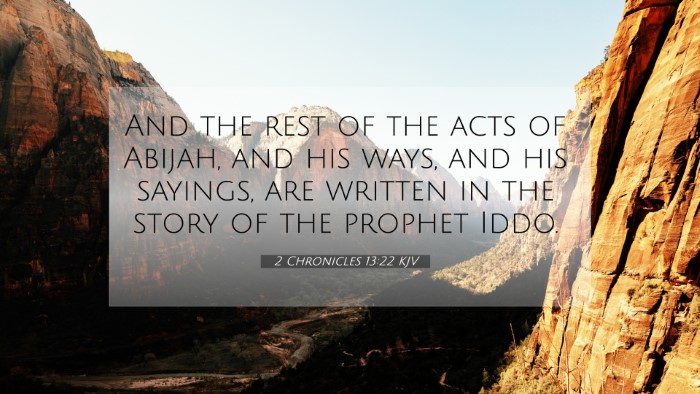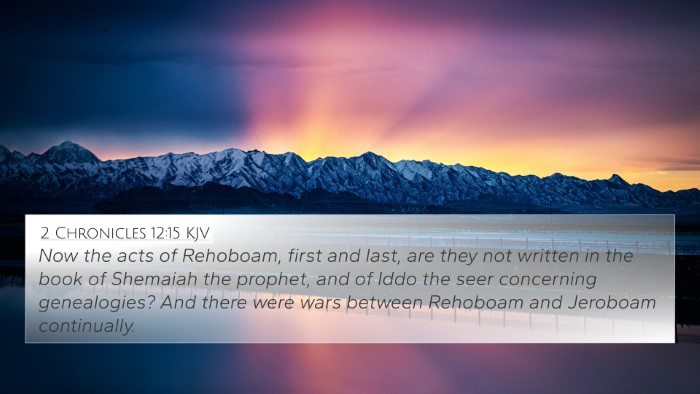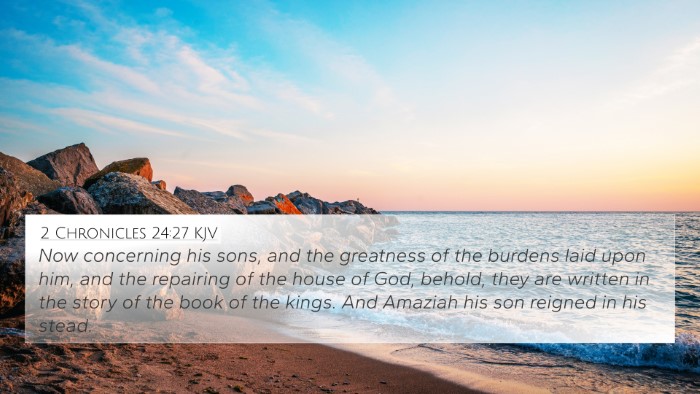2 Chronicles 13:22 - Understanding the Verse
Bible Verse: "And the rest of the acts of Abijah, and his ways, and his sayings, are they not written in the book of the chronicles of the kings of Judah?"
This verse serves as a concluding remark in the account of King Abijah, encapsulating the essence of his reign and the historical record of his actions and declarations.
Summary of Insights
The verse indicates that Abijah's deeds and the circumstances of his reign are recorded in the books referred to as the "chronicles of the kings of Judah." This aligns with the biblical tradition of documentation, signifying that the narratives of these kings served not just as historical accounts but as moral and spiritual lessons for future generations.
Commentary Insights
-
Matthew Henry: Henry emphasizes the importance of historical records of the kings, suggesting that they serve to remind readers of God’s providence and justice in judging nations based on their rulers. The concluding nature of the verse indicates that there is more to learn from Abijah's reign and that future readers should seek it out.
-
Albert Barnes: Barnes notes that the phrase "the rest of the acts" implies that Abijah's reign, while significant, contained various aspects that merit further observation. He connects this knowledge to a broader understanding of the role of leadership in Israel’s history and its implications for God's covenant with His people.
-
Adam Clarke: Clarke highlights that the "book of the chronicles" refers to the records kept by historians of the time. He points out this is a general practice in ancient monarchies and serves a dual purpose: providing historical context and spiritual lessons through the events detailed therein.
Cross-References Related to 2 Chronicles 13:22
- 1 Kings 15:1-8 - Introduction and conclusion of Abijah’s reign in a parallel account.
- 2 Chronicles 11:20-21 - Discusses the context of Abijah's family and his role in Judah.
- 1 Chronicles 3:10-14 - The genealogy of David’s line includes Abijah, providing historical connections.
- 2 Kings 14:1-6 - The narrative of kings after Abijah, highlighting the continuity of Israel’s leadership.
- Hebrews 11:32-34 - Refers indirectly to the acts of faith of various leaders, which could imply the significance of Abijah's reign.
- 2 Chronicles 7:17-22 - Discusses the importance of following God's commandments, relevant to kings’ actions.
- Isaiah 37:5 - Mentions the kings in lineage and their decisions impacting Judah's fate.
Significance in Biblical Context
The significance of 2 Chronicles 13:22 extends beyond mere record-keeping; it engages in a thematic dialogue within the Biblical text. The chronicler calls attention to the consequences of leadership decisions in alignment or opposition to God’s will.
This verse helps facilitate a deeper understanding of:
- God’s ongoing relationship with Israel as exhibited through the actions of its leaders.
- The moral frameworks that guide the behavior of rulers within the biblical narrative.
- The importance of memorializing history for future generations to learn from the past.
Tools for Deeper Study
For those interested in deeper studies of cross-references and biblical themes, employing resources such as a Bible concordance or a Bible cross-reference guide can be immensely beneficial. They aid in:
- How to find cross-references in the Bible and the implicational study of related scriptures.
- Identifying connections between Old and New Testament contexts.
- Facilitating comparative studies of parallel verses.
Concluding Thoughts
The verse, while a closing remark on Abijah’s rule, opens a window for reflection on the broader themes of leadership, heritage, and moral responsibility within biblical texts. It illustrates the importance of context when analyzing the reign of kings and the overarching narrative of God’s relationship with His people.
For those engaged in cross-referencing Biblical texts or studying thematic Bible verse connections, exploring the linked scriptures can greatly enhance understanding and insight.





